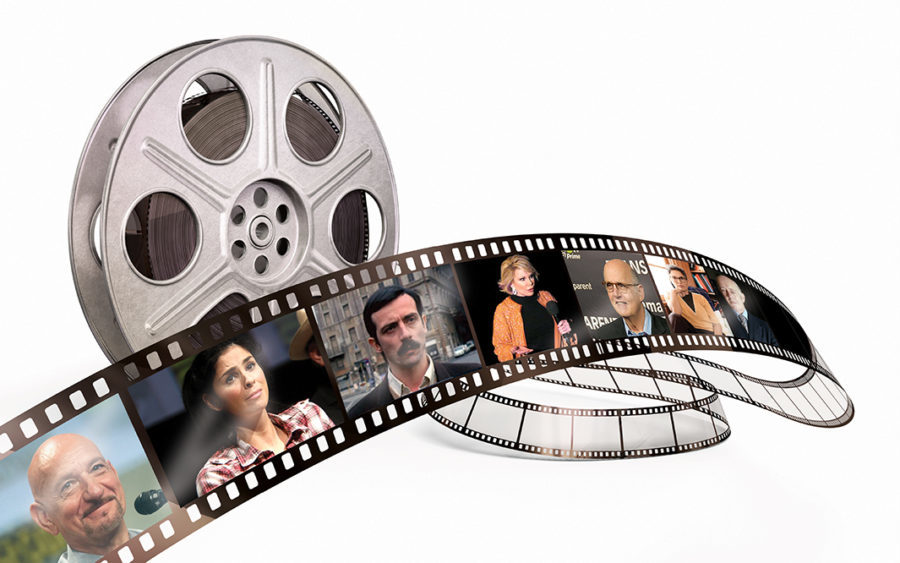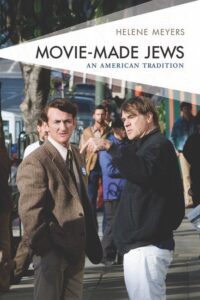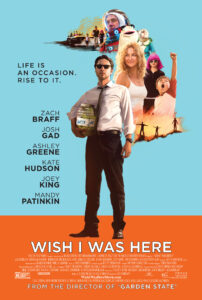Too Jewish for Hollywood?
An excerpt from the book Movie-Made Jews: An American Tradition

(Image source: Washington Jewish Weekly)
The following excerpt comes from Helene Meyers’ Movie-Made Jews: An American Tradition. The book explores depictions of Jews in American movies and how those films have influenced how Jews and others think about Jewish identity in the United States.
This excerpt comes from the book’s fifth chapter: “Assertively Jewish Onscreen.”
***
 Like Keeping Up with the Steins, Zach Braff’s 2014 Wish I Was Here illuminates the challenges and the possibilities of making not only Jews but also Jewy movies. The production history of this film is arguably more well-known than the film itself, though the Jewishness of that history is too often overlooked. Braff, the director of the 2004 indie hit Garden State and the star of the long- running TV show Scrubs, wanted to make a “thematic” rather than a literal sequel to Garden State. While Garden State focused on the angst of twenty- somethings trying to find their way in the world, Wish I Was Here moves into the next decade of life. This film focuses on a still-aspiring actor—Aidan Bloom (played by Braff)—whose professional dreams are at odds with the needs of a family, which includes wife Sarah (Kate Hudson) and two children whose attendance at Jewish day school is subsidized by a dying observant grandfather (Gabe Bloom, played by Mandy Patinkin).
Like Keeping Up with the Steins, Zach Braff’s 2014 Wish I Was Here illuminates the challenges and the possibilities of making not only Jews but also Jewy movies. The production history of this film is arguably more well-known than the film itself, though the Jewishness of that history is too often overlooked. Braff, the director of the 2004 indie hit Garden State and the star of the long- running TV show Scrubs, wanted to make a “thematic” rather than a literal sequel to Garden State. While Garden State focused on the angst of twenty- somethings trying to find their way in the world, Wish I Was Here moves into the next decade of life. This film focuses on a still-aspiring actor—Aidan Bloom (played by Braff)—whose professional dreams are at odds with the needs of a family, which includes wife Sarah (Kate Hudson) and two children whose attendance at Jewish day school is subsidized by a dying observant grandfather (Gabe Bloom, played by Mandy Patinkin).
Braff’s vision for this film was to explicitly engage the spiritual questions of those who were raised as traditional Jews but were trying to find their own spiritual paths as proud but overwhelmingly secular Jews. According to Braff, he and his brother Adam called upon their own experience in cowriting the script: “My parents force-fed me this religion, and there’s aspects of it [that] I love, but what is my spirituality right now? What do I believe? How can I reconcile my belief in science with faith? And gosh, once I start having children, what the hell am I going to teach them? We just thought that was a really interesting thing to write about, because no one else seemed to be making a movie about it.”
However, when this successful director/actor tried to get the financing for such a script, he found that the Jewiness of it was an insuperable impediment: “There was definitely the implication that the Judaism should be toned way down because it wouldn’t appeal to a broad audience.” Expanding on this point, Braff comments, “The studio system isn’t going to make a movie about a Jewish family. A financier wasn’t going to make a movie about a Jewish family. It’s very, very hard to get—we’re 2 percent and shrinking—a movie about Jewish people made. If I made this in the studio system, they’d be like ‘ix-nay on the ewish-jay.’ I’d have to [dial] it down.”
Rather than dial or tone down the Jewishness, he took the suggestion of producer Stacey Sher and opted to supplement his personal financial stake of $2 million with a Kickstarter campaign. Much to his surprise and delight, this “giant social experiment” of crowdfunding financing was wildly successful, with 46,250 people kicking in a total of more than $3 million. While this financing strategy provided Braff with the “creative freedom” he needed to make his vision of the film, it also created a public relations nightmare that impacted the critical reception of the film.
 According to his critics, Zach Braff’s decision to use Kickstarter funds was the ultimate exercise of white privilege. Writing for Bitch, Lucy Vernasco identifies Braff as “not a struggling artist who can’t find the support of a traditional film studio, like many interesting and forward-thinking movies that turn to Kickstarter to get off the ground.” Rather, she classifies him as “a thirty- something white dude living in LA…[who] used all that support to follow his true passion of creating a movie that’s all about a thirty-something white dude living in LA following his dream.” Devin Faraci echoes Vernasco, accusing Braff of making “whitesploitation films”: “We all understand that you pay for these things the way movies are always paid for, not using the funding model for people who are outside of the system, people who face actual adversity when trying to get their vision accomplished. People who, basically, don’t have nine seasons of sitcom royalties. . . . He could get his movie made in the standard system—he just couldn’t get it made the way he wanted to get it made. . . .This is privilege. This is the face of privilege.” Interestingly enough, these two reviewers never use the “J” word; with that key omission, they conflate Jewishness and whiteness, while effectively denying that a specifically Jewish vision has any sort of legitimacy or claim to diversity.
According to his critics, Zach Braff’s decision to use Kickstarter funds was the ultimate exercise of white privilege. Writing for Bitch, Lucy Vernasco identifies Braff as “not a struggling artist who can’t find the support of a traditional film studio, like many interesting and forward-thinking movies that turn to Kickstarter to get off the ground.” Rather, she classifies him as “a thirty- something white dude living in LA…[who] used all that support to follow his true passion of creating a movie that’s all about a thirty-something white dude living in LA following his dream.” Devin Faraci echoes Vernasco, accusing Braff of making “whitesploitation films”: “We all understand that you pay for these things the way movies are always paid for, not using the funding model for people who are outside of the system, people who face actual adversity when trying to get their vision accomplished. People who, basically, don’t have nine seasons of sitcom royalties. . . . He could get his movie made in the standard system—he just couldn’t get it made the way he wanted to get it made. . . .This is privilege. This is the face of privilege.” Interestingly enough, these two reviewers never use the “J” word; with that key omission, they conflate Jewishness and whiteness, while effectively denying that a specifically Jewish vision has any sort of legitimacy or claim to diversity.
However, the Kickstarter funds, along with the $2 million Braff himself put into the film, prevented the “privilege” of whitewashing Jewishness from Braff’s vision, which was picked up by Focus Features after a premiere at Sundance. There’s plenty of Jewish shtick here, including a dog called Kugel and a grizzled rabbi who rides a Segway in hospital corridors, bumping into walls as he seeks to fulfill his pastoral duties. Yet, there is also serious Jewish wrestling, notably represented when Aidan seeks out a younger rabbi for spiritual guidance. This sequence cuts from Aidan’s space superhero fantasies, his more customary cosmic wanderings, to his entrance into a Jewish space.
Struggling to come to terms with the impending death of his father as well as the gap between his Jewish-school-educated children (aka his “indoctrinated matzo balls”) and his own lapsed Jewish commitments, Aidan witnesses schoolboys singing “Oseh Shalom” in harmony. He then banters and reckons with a rabbi whom Braff has categorized “as the sort of fantasy rabbi I’ve never met.” Aidan tells the rabbi that he kept kosher until his bar mitzvah and that his becoming a man meant that his father allowed him to go his own way and eat a bacon cheeseburger. To the rabbi’s question about his current spiritual connections, Aidan responds with ideas of infinity represented by the sky. The rabbi sagely counsels him to “try not to get caught up in the God who wants you to be kosher and study the Torah. Start with the God of the infinite universe and imagine that force is trying to guide you through the most challenging part of your life, even if it has to appear to you in the form of a spaceman.” This “fantasy rabbi” meets Aidan where he is spiritually. As a result, Aidan figures out what he can teach his children: he recites poetry in the desert (certainly a space of Jewish wandering!) and, while he and his children are repairing the world of their backyard, identifies such recitation as “a prayer you’re not expecting anyone to answer.”
Helene Meyers is the author of four books and a public scholar who writes on Jewish culture, higher education, and humanities career pathways. She has bylines in the Chronicle of Higher Education, Inside Higher Ed, Tablet, Ms. Magazine Blog, and Lilith Magazine. Recently retired from Southwestern University, where she was Professor of English and McManis University Chair, she can be found on Twitter @helene_meyers and at https://helenemeyers.com/
***
Interested in more on this topic? Check out the Revealer podcast episode with Helene Meyers: “Hollywood, Movies, and American Jews.”